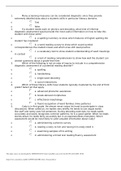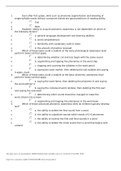ENG 130 (ENG130)
Lees-Mcrae College
All 28 results
Sort by
ENG 130 LETRS Unit 1 Session 8
LETRS Unit 2 Session 2.
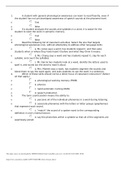
-
LETRS Unit 2 Session 2 ENG 130
- Exam (elaborations) • 1 pages • 2022
-
- $6.49
- + learn more
1. A student with general phonological awareness can learn to read fluently, even if the student has not yet developed awareness of speech sounds at the phoneme level. o true o false 2. If a student analyzes the sounds and syllables in a word, it is easier for the student to store the word in semantic memory. o true o false 3. Read the following list of classroom activities. Select the one that targets phonological awareness only, without attempting to address other language skills. o ...
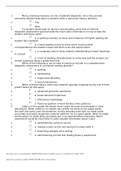
-
LETRS Unit 1 Session 8
- Exam (elaborations) • 1 pages • 2022
-
- $8.49
- + learn more
1. Many screening measures can be considered diagnostic since they provide extremely detailed data about a students skills in particular literacy domains. o true o false 2. If a student needs work on phonics and decoding, what kind of informal diagnostic assessment would provide the most useful information on how to help this student with these skills? o a. a spelling inventory to show which features of English spelling the student has mastered o b. a word-reading survey to show which s...
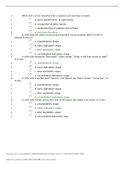
-
LETRS Unit 1 Session 5
- Exam (elaborations) • 1 pages • 2022
-
- $8.49
- + learn more
1. What skill is most important for a student just learning to read? o a. quick identification of sight words o b. recognition of letter names o c. understanding of prefixes and suffixes o d. accurate decoding 2. A child sees the word savanna and sounds it out accurately. Which of Ehri’s phases is she in? o a. prealphabetic stage o b. early alphabetic stage o c. later alphabetic stage o d. consolidated alphabetic stage 3. A child who responds “Bow-wow!” when asked, “What is th...
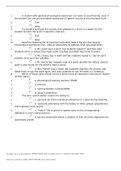
-
LETRS Unit 2 Session 3.
- Exam (elaborations) • 1 pages • 2022
-
- $8.49
- + learn more
1. A student with general phonological awareness can learn to read fluently, even if the student has not yet developed awareness of speech sounds at the phoneme level. o true o false 2. If a student analyzes the sounds and syllables in a word, it is easier for the student to store the word in semantic memory. o true o false 3. Read the following list of classroom activities. Select the one that targets phonological awareness only, without attempting to address other language skills. o ...
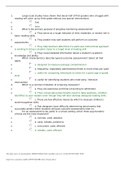
-
LETRS Unit 1 Session 7.
- Exam (elaborations) • 1 pages • 2022
-
- $9.49
- + learn more
1. Large-scale studies have shown that about half of first-graders who struggle with reading will catch up by third grade without any special interventions. o true o false 2. What is the primary purpose of progress-monitoring assessments? o a. They serve as a rough indicator of mild, moderate, or severe risk in basic reading skills. o b. They predict how well students will perform on outcome assessments. o c. They help teachers determine if a particular instructional approach is workin...
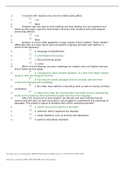
-
LETRS Unit 1 Session 6
- Exam (elaborations) • 1 pages • 2022
-
- $9.49
- + learn more
1. A student with dyslexia may also be intellectually gifted. o true o false 2. Students who are slow at word reading and text reading, but can segment and blend sounds orally, typically have better outcomes than students with phonological processing deficits. o true o false 3. Dyslexic is a term often applied to a large subset of poor readers. These readers’ difficulties with accurate, fluent word recognition originate primarily with deficits in which of the following? o a. languag...
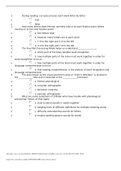
-
LETRS Unit 1 Session 3
- Exam (elaborations) • 1 pages • 2022
-
- $8.49
- + learn more
1. During reading, our eyes process each word letter by letter. o true o false 2. How many letters does the eye normally take in at each fixation point before moving on to the next fixation point? o a. five letters total o b. however many letters are in each word o c. 7–9 to the right and 3–4 to the left o d. 3–4 to the right and 7–9 to the left 3. The Four-Part Processing Model helps us understand _________________. o a. which part of the brain handles word recognition o b. h...
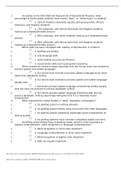
-
LETRS Unit 1 Session 1
- Exam (elaborations) • 1 pages • 2022
-
- $9.49
- + learn more
1. According to the 2015 National Assessment of Educational Progress, what percentage of fourth-grade students have scored “basic” or “below basic” in reading? o a. 33% of students nationally, equally split among white, AfricanAmerican, and Hispanic students o b. 23% nationally, with African-American and Hispanic students making up a disproportionate amount o c. 50% nationally, with white students making up a disproportionate amount o d. 64% nationally, with African-American and H...

That summary you just bought made someone very happy. Also get paid weekly? Sell your study resources on Stuvia! Discover all about earning on Stuvia

